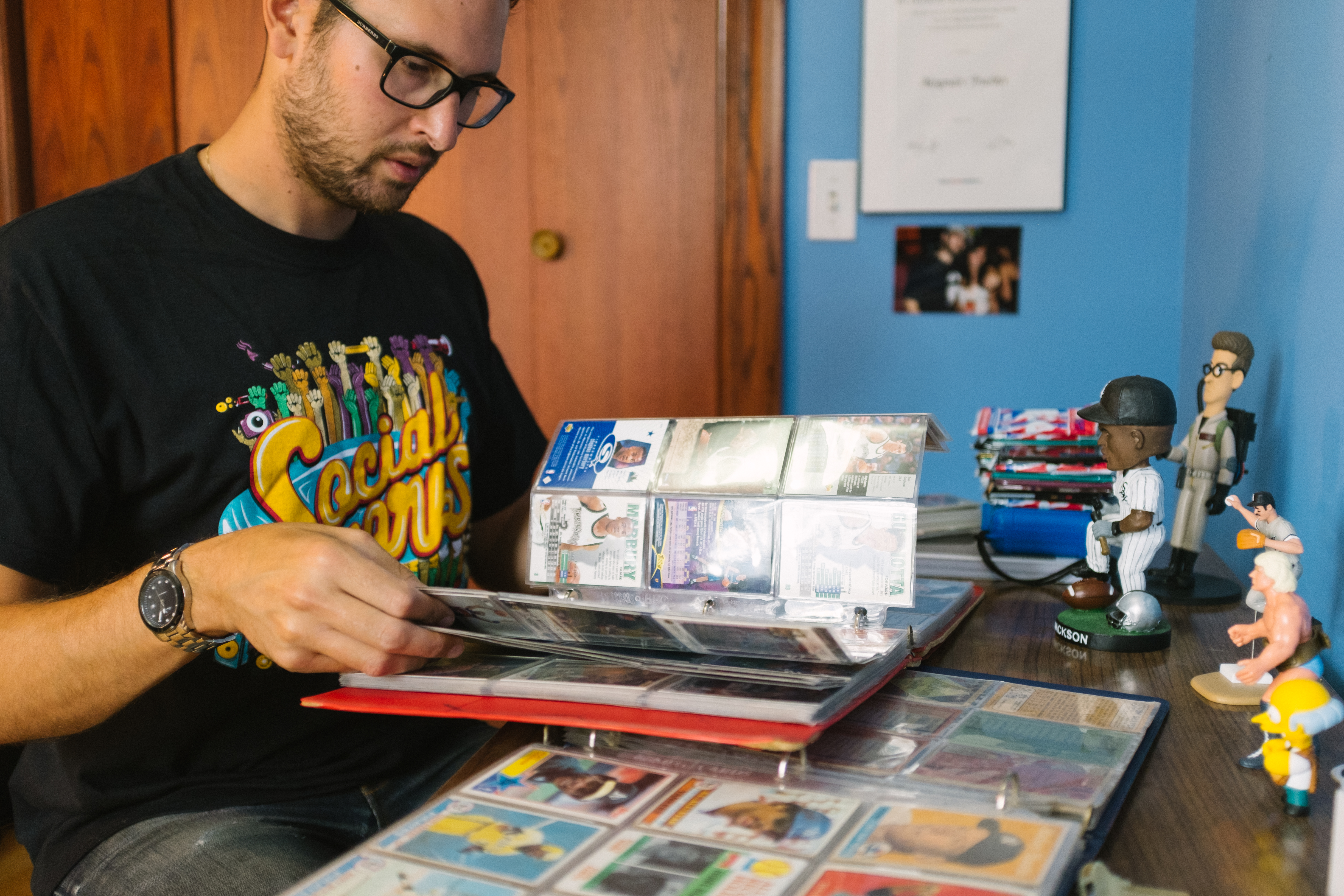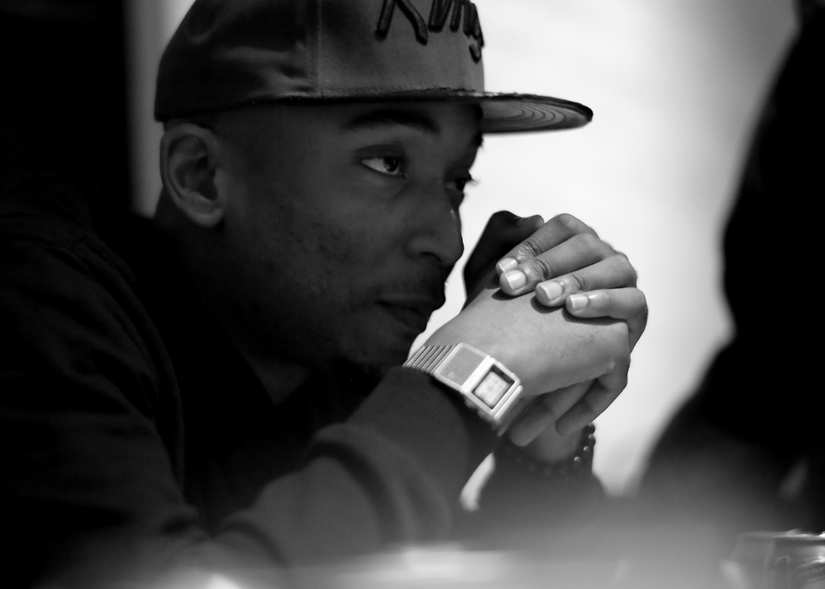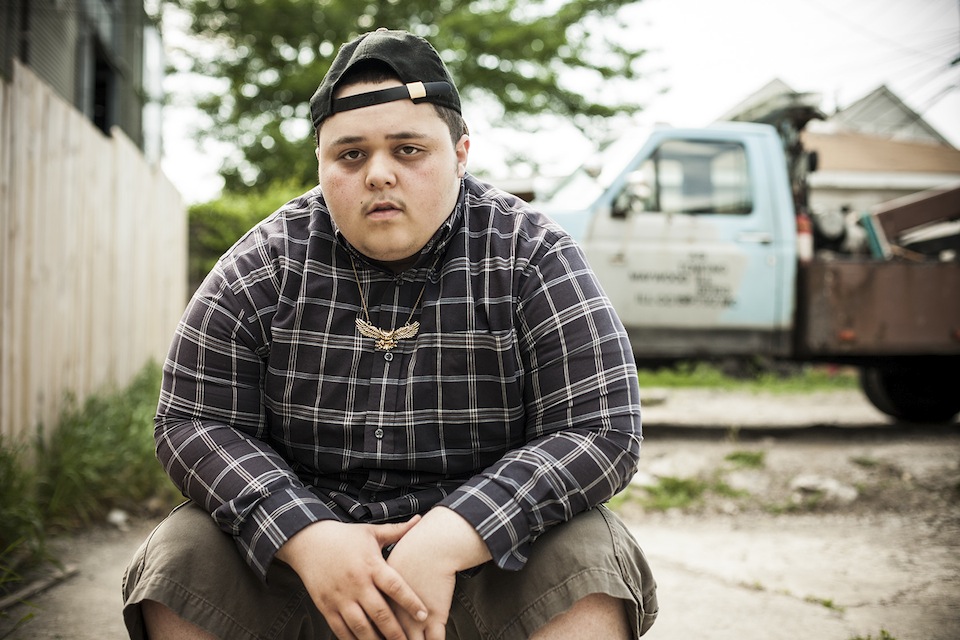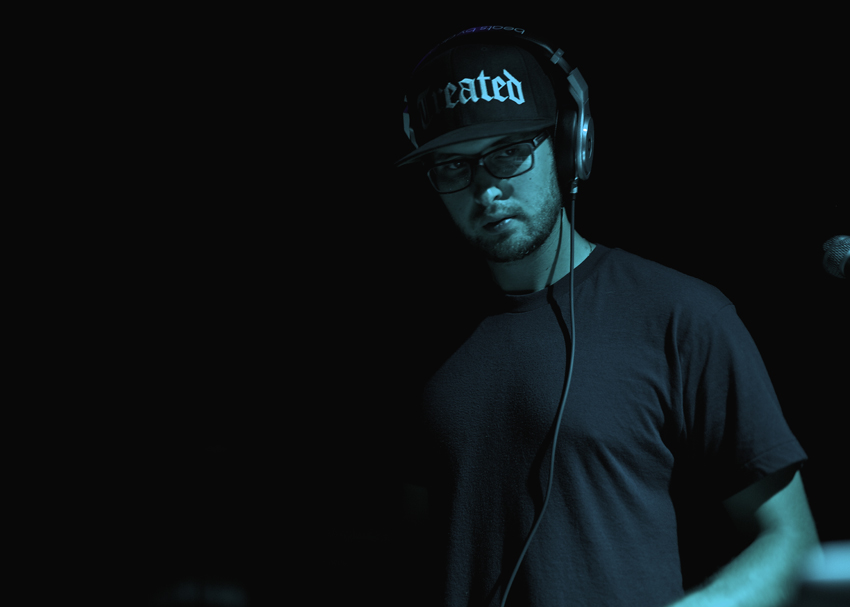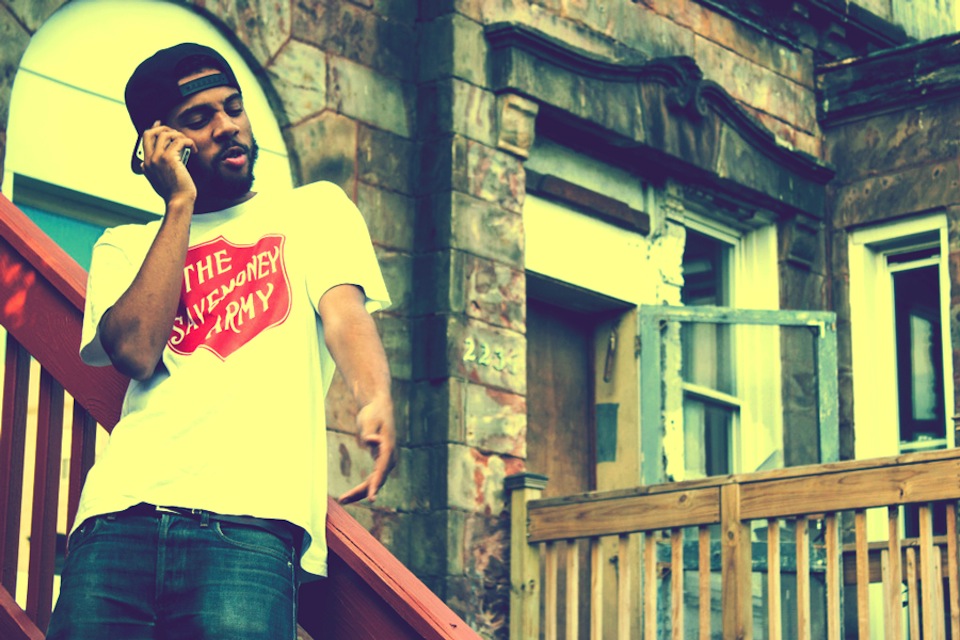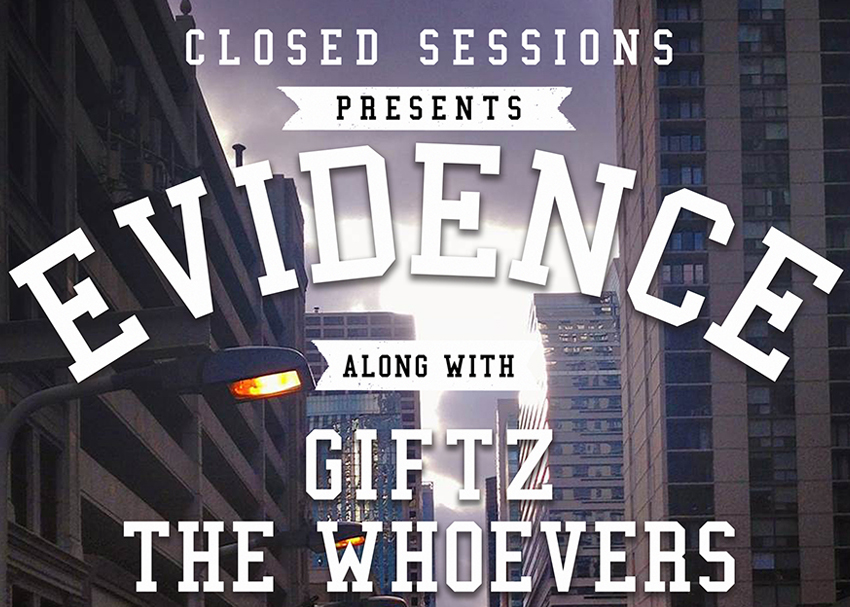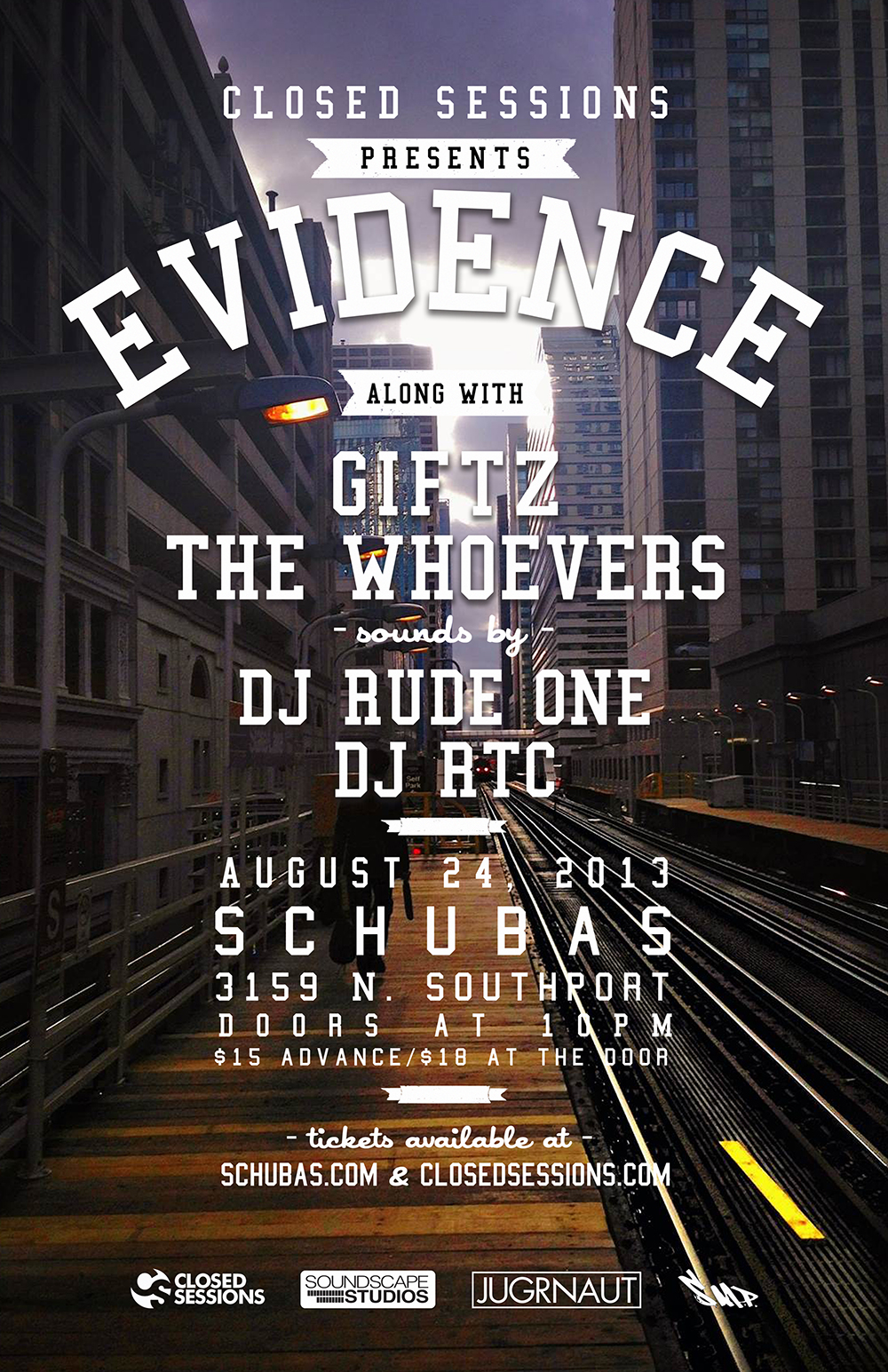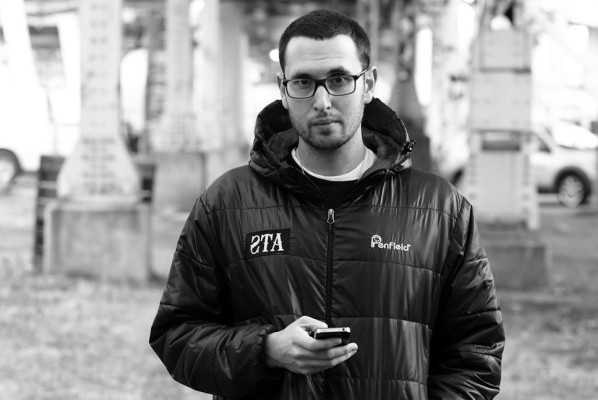RH Collectors: DJ RTC
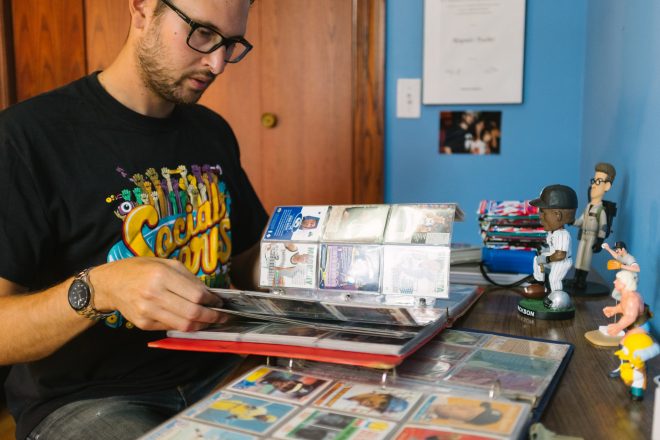
Many music heads are also collectors. There's a common thread between seeking out new and rare sounds and using that same drive to acquire and celebrate other passions that ties collectors of all kinds. RH Collectors is a series that aims to showcase the collections of the various music heads in Chicago and beyond. In our last edition, we spoke to the Stitch Gawd, who showed off her collection of art and memorabilia that she has collected throughout her time in the Chicago music scene. Today, we turn the spotlight onto Closed Sessions + rubyhornet honcho, DJ RTC.
Going back to his early childhood, RTC has been an avid baseball and basketball collector, and boasts an impressive collection. For this installment, I spent time with RTC's card collection and asked to speak on a few choice cards. Peep it below.
If you've got a collection you want to talk about, hit us up. We want to talk to you.
What got you into collecting cards?
I think it was partly playing sports, and playing on teams all based on major league teams. My first team was the [Atlanta] Braves. I was young, like 6 or 7 years old. I just remember watching the real Braves on TBS and all my teammates wanting to be certain players. The first baseball player I really knew and wanted to emulate was Dale Murphy. Later, my brother introduced the concept of baseball cards to me and I got into keeping stats and dove into the card collecting heavy with many of my friends. It turned into a big social activity. My friends and I all played in the same baseball league, and we all wanted to be like our favorite players. We picked our jersey numbers based on those players. We would hang out all day playing sports and/or trading cards. Then from there it became more obsessive, it was all about who could get the most rare cards in your peer group. It was a good era to be a kid in that the popularity of cards was at an all-time high. It was a great way to feel closer to the game.

Ozzie Guillen: 1985 Fleer Extended Rookie Card
Ozzie Guillen was a shortstop on the White Sox from 1985 to 1997. Then he briefly went to The Orioles, then the Braves, and ended his career with the Devil Rays. In 2003 he came back to manage the White Sox. Ozzie Guillen was my favorite baseball player growing up. I modeled my stance in little league after him, many coaches corrected that because it wasn’t an ideal stance for a little kid to have (fundamentally speaking). My dad started taking me to this card shop by Comiskey Park, and I also got a subscription to this magazine called Beckett that listed the value of baseball cards, and I started noticing this thing called the XRC card, which stood for “extended rookie card.” I saw Ozzie Guillen’s XRC in Beckett and finally tracked this down . I don't even know at what point I got it, but it took a while. My dad and I got it at Grandstand in Bridgeport. Definitely a prized card, many Sox fans around my age view Ozzie as the man. I can't speak for older or younger fans, but definitely in my age group, Ozzie was the man. If we could one day throw a Closed Sessions party with Ozzie Guillen in attendance, that’d be great.

Sandy Koufax: 1963 Topps
I connect with Koufax on many levels. One of the great things about baseball, why I also think I like it so much, is that my dad, he kind of got into it with me. My dad's older, he had me much later in life, when I was 10 he was already 55. For him, his generation of baseball player was from the ‘50s and 60’s. Sandy Koufax was revered in every Jewish household, he was one of the first athletes to proudly be Jewish. Game one of the 1965 World Series games Yom Kippur, which is the Jewish day of atonement. Even for Jews who don't go to synagogue regularly, Yom Kippur is the one day where you’re supposed to sit back and observe. Sandy Koufax was the Dodgers best pitch and was supposed to pitch that game, he decided to sit out and observe the holiday and became a Jewish folk hero. That’s one piece of it for me, another is in Sunday School there was this teacher who always labeled me as a trouble maker for whatever reason. Whenever anyone did something, he would blame me and send me to the library. So I would be able to get out of Hebrew class and go to the library, and I actually preferred it like that. I’d have nothing to do, so I'd just check out books. There was a book about Sandy Koufax, and anytime I was sent to the library, I’d find the book and pick up from wherever I left off. I learned that the first few years of his career he was really bad, he was 2-2, 2-4, 5-4, 11-11, ERA was high, he wasn't very good. He had to figure out how to succeed, and its unique because he’s in the Hall of Fame and revered as one of the greatest pitchers ever. He only had a few great seasons, but they were so good that he ended up as one of the best. He also retired early because although he could still play, he said he wanted to “live the rest of my life with the use of my arms.” So I think Sandy Koufax has a lot of things that make him unique: from almost being cut to becoming one of the best, to retaining personal beliefs over sports, and even the idea of quitting while you’re ahead, athletes using their bodies while they still can. Thats why I connect with Koufax on so many levels. This card from 1963 I got at a shop in Skokie. It was one of my first major cards for sure.

Jackie Robinson: 1954 Topps
My brother's friend Josh was cleaning up his room and that included getting rid of a slew of all of his baseball cards. He dumped them all in one big bag. He called me up and said, 'if you want to sort through this bag and keep the cards, that's fine but just know its mostly scrub players, worthless cards.' So I’m like, 'ok, I got nothing to do.' It was summer vacation, I was probably in 3rd or 4th grade. He lived next door, and I went over got this large paper shopping bag of cards. I take them home and start going through them. It's been a few hours, I’ve gotten some good cards but nothing special... I picked up the next card by the back, I see "Brooklyn Dodgers" and some stats and I’m just getting this feeling like, 'oh shit, oh shit.' I was maybe 11 or 12 at the time. It only took a second, but I remember turning the card over in slow motion, in my head thinking 'please let it be, let it be' and I remember just having a heart attack. A real life Jackie Robinson baseball card! My mom had these books at home that were called "ValueTales", they are a series of books that taught kids morals and to believe in themselves etc... There was a book about the story of Johnny Appleseed, Abraham Lincoln, but as cartoons and starting as kids. One of my favorite editions of the series was the Jackie Robinson story, which taught the value of courage. I remember viewing him as this epic figure, and here I was with his baseball card. I remember I was so naive that I called Josh up and was like, 'thank you so much! I can't believe there was a Jackie Robinson card in there,' when he was probably on the other line thinking, 'damn...' It was my prized possession, I had it in a single case, one day I guess I left it on the couch or somewhere, I go to bed, then later hear my mom on the phone, all of a sudden all I hear is 'OH NO, THE DOG HAS THE JACKIE ROBINSON CARD OH MY GOD!" I jumped out of bed, found it in this (ripped) condition, had a meltdown, I probably wanted to kill the dog. I was so sad I probably cried myself to sleep that night. I was so angry and sad I told my mom I didn’t even want it, get rid of it, I didn’t even look at it for maybe 6 months. But she always kept the card around, so later I healed enough to finally put it back in my book and accept it, because it is still a real Jackie Robinson card - it is ripped, but at least I have one, So (Shrugs)...

Michael Jordan: 1990 Upper Deck
For anyone that doesn’t know, really sadly Michael Jordans father was killed the summer after the Bulls won their third championship, the first 3 peat and as a way of coping Michael Jordan stepped away from the Bulls and pursued baseball because that was his dad's dream (to play in the major leagues). Jordan was good enough to get to the minor leagues with the Birmingham Barons, it had always been known before that he could play baseball well. This card was actually from before that, when he would play in spring training games. The White Sox and Bulls have the same owner. If you’re a real collector you have to have this. It was one of the first years of upper deck coming out and this was just a dope card to have.

Bo Jackson: 1991 Topps Traded
This was big because he was severely injured playing football. He had to retire from the sport and took a while off from baseball. Many people thought he was done. He was released by the Royals right before the season started, the White Sox signed him after the season started and everyone was pretty excited. This was included in Topps “traded edition”, which would come out midway through the season every year and multiple brands started following that format, reissuing cards for marquee players. This was the first card of Bo Jackson as a member of the White Sox. It was significant because he was such a famous player and so heavily tied to the Royals. And extra significant to me as a lifelong White Sox fan. My dad used to take my brother and I to Toys-R-Us and we’d buy packs of trading cards and my brother would always end up taking the best cards because he was 8 years older than me. He’d give me some of my personal favorite players that I'd heard of but actually sucked, while he’d pocketed a Mo Vaughn rookie card or this Bo Jackson card. One day I decided it was time to take them back, so I hope he’s not reading this because I did in fact steal this card back from him. So yeah, First ever Bo Jackson card on the Sox, the highlight of the Topps Traded Edition 1991.

Shawn Respert: 1995 Classic Wooden Award Contender (autographed)
My brother went to college at Michigan State and Shawn Respert and Eric Snow were there and they formed Fire & Ice. He is was the school leader in 3 pointers made, and Michigan State's all-time leading scorer. This card is special because it came from his collection, which is pretty interesting that I think about it. He graduated in 1995, and was my favorite basketball player at that time. When he got drafted, I wrote him a letter wishing him good luck with The Bucks and stuff. He wrote back with this signed basketball and that cemented him for me as one of my favorites. He never really made it in the NBA. It came out years later that he had stomach cancer and just never told any of his teams. But man he was a hell of a college player and a great guy.

Kobe Bryant: Fleer Ultra 95-96 Rookie Card
Outside of Kevin Garnett, Kobe Bryant really opened the floodgates for high school players to go straight to the NBA. This was during the height of my card collecting. Getting a Kobe rookie wasn’t much of a big deal at the time, since he hadn’t done anything in the NBA yet, but I had a feeling that this was gonna be special. Similar to music, and how you can tell certain artists are going to be something special, I saw that with Kobe Bryant and basketball. I got this one in a pack. So many years later during his famous feud with Shaq I remember a lot of people siding with Shaq and at the time I was in teach for america training which was in Long Beach, California. There were a lot of kids from LA in that program and we were on the school bus one day and the radio announced that Shaq had just been traded to The Heat. All the kids were like “oh no!! Fuck Kobe” while I was just laughing since I was just a Bulls fan with no particular stake in either side.
RH Interview: Andrew Barber Talks FakeShoreDrive At 10 and Much More
The first time I met Andrew Barber (fuck, 10 years ago!) I couldn't wait for him to shut up and leave me alone. In response, he (unsurprisingly) thought I was kind of a jerk. It was December 2007, and I was DJing an event at the Nike Offices entitled The Brotherhood. It was a coming together of formidable streetwear brands at the time - PHLI, LEADERS, and Self-Conscious and a celebration of the budding streetwear scene, one that has birthed Fat Tiger, Don't Be Mad, Jugrnaut, and of course the long-lasting St. Alfred. Along with being one of the DJ's, I was helping get the word out and handled press invitations. That was some shit I did, especially for Dave Jeff of PHLI, who took me under his wing as a mentor.
A week or two before the event, I got an email from a guy named Andrew Barber, who had just started a blog called Fakeshoredrive. He had limited posts up or a big audience, but after briefly checking out the site (I loved the name), I hit Dave and said we should hook this dude up with a pass.
Fast forward to the night of the event, and Andrew walked up to me while I'm DJing, introduces himself and thanks me for the invite. If memory serves, he then asked me something about going to IU, where he also attended college. I can't say for sure because I was trying to pay attention to my blend - I think it was something like "Da 80's" by Styles P into "EMG" by El-P. I made quick work of it, and we went on to respectively enjoying the night.
I didn't know it at the time, but that night kicked off a routine of seeing Barber damn near every week, sometimes there would be weeks where we'd run into each other every other day. It was the birth of the blogosphere and Fakeshoredrive and rubyhornet collectively were the frontlines of the Chicago Hip Hop sector of the Internet. Go back to early posts on either site and "props to ______" litter the pages. That's how you got props back in day. Be the first to post new music, have some kind of exclusive content, and "get your name up" around the interwebs.
"'I'd see you guys do something really dope and be like "damn I wish I would've thought of that first,' or see you guys beat me to an idea or an event or an exclusive. It kept me on my toes for sure," Andrew Barber tells me on the cusp of Fakeshoredrive's 10th Anniversary party happening 11/4 as part of Red Bull Sound Select Presents: 30 Days In Chicago. "We had to always be innovative and we had no blueprint to follow. We were really just tinkering around to see what would float. Trial by error."
The errors and the trials were both aplenty, but Fakeshoredrive also had tremendous breakthroughs from the raging comment section, the classic Lupe Fiasco leaks, Shade 45 Mixshow, and early discovery and championing of artists such as Chief Keef, King L, and Chance The Rapper. We could go on and on, but the legacy speaks for itself and there's a bevy of Chicago emcees, producers, designers, and just passionate Hip Hop fans that would agree.
Andrew always said that when FSD hit 10, he'd have a big party. Well, FSD finally hit double-digits and it's time to celebrate. In honor of the 10 years, I chopped it up Andrew about reaching this point, quitting his day job, how the role of blogs has changed since we started, and much more.
Peep it below... and see you Saturday.

RTC: I remember back in the day, every time the FSD anniversary came around you would say, “at 10 we’ll have a party.” In those early years, was getting to 10 years something you saw as realistic? I know it may be tough to go back, but how do your thoughts on the future of FSD back then compare to the reality right now?
Andrew Barber: Haha, I finally had to do it. I never really wanted to do a party celebrating the brand or myself or anything like that. I like to let the work speak for itself. I prefer to keep my head down and keep working, and put that energy into how we're gonna stay around for another year. But making it to 10 is a milestone, so we had to do something special for it. I honestly didn't envision this thing lasting 10 years. I mean, you saw this thing from day one, and it was really just a hobby at the time -- it wasn't my career. I'd always hoped to make it a career, but at the time it was unfathomable. The fact that anyone cares after a decade is just crazy to me. Stuff hardly lasts 18 months in the music industry.
RTC: When you started the site, you had a full-time job and were writing from your desk. What pushed you to blog so heavy back then?
Andrew Barber: I was just doing it out of love. I wanted to be a part of the local scene and the hip-hop community in any way I could, so it just seemed like a cool way to get involved. There was definitely a void for what we were doing. At that time in 2007, it felt like there was something special going on here. Something untapped. It was an exciting time to be involved in the scene. It had a certain magic to it, and it wasn't super crowded. But I was sort of living a double life. Going to hip-hop events at night and working a corporate gig during the day. I did that for about four years.
RTC: Following up on the double-life you were living at the beginning. Did that get progressively harder as the site grew? Was there any specific tipping point that was like – I’m done, or was it a planned out process to leave your job?
Andrew Barber: For the first couple of years, it was still pretty underground, so my coworkers had no idea. But once I got my first press -- a spread in the Chicago Reader -- everything changed. I'll never forget the day that issue dropped -- my boss called me into his office and asked me to close the door. I thought I was going to get fired right there on the spot. But he was super cool about it. Some of my other superiors weren't as supportive, so needless to say my corporate gig was pretty weird after that. Understandable, though.
It took me another two years to leave that situation, but I finally made the leap on my own. In fact, it was my wife who pushed me to quit and focus on FSD full time. I was just missing too many opportunities being confined to a cubicle all day. A lot of people tried to talk me out of quitting since I had a cushy gig with benefits and a 401K, but my now-wife, believed in me and told me that if I didn't do it then I'd probably never do it. She said she'd have my back if I failed and would help me get back on my feet if it didn't work out. I quit and never looked back.

RTC: I’d say Chicago Hip Hop is skeptical, what was it like proving yourself to artists and the community, was that acceptance immediate – how did you start to gain the access and respect of everyone?
Andrew Barber: Chicago was so skeptical -- especially trying to come in as a "blogger" in 2007. It certainly wasn't the cool thing to do back then. I remember people thinking I was some computer dork or whatever. Keep in mind, this was still the mixtape era, so you'd go to events and people would be selling their CDs out front. Eventually, they began passing them out for free, but in those early days, it was still a hand-to-hand hustle. The idea of people giving me their music for free was pretty foreign in Chicago at that moment. Also, the scene wasn't really utilizing YouTube at the time to drop their videos -- everyone was still trying to get play on MTV or BET.
I feel like GLC understood that super early. As did The Cool Kids, Mano, Holt and Mic Terror. I remember Astonish having a really dope video early on when he was with the Molemen. L.E.P. as well.
RTC: You once asked Yung Berg if he was Jewish to kick off an interview – which I thought was hilarious. Do you have a favorite article or piece you’ve done? Maybe not your favorite, but one that was significant for the growth of the site?
Andrew Barber: Wow, I forgot about that. You have a great memory. I remember that was a controversial interview at the time because he made some comments about the L.E.P. Bogus Boys, and they had a rebuttal and everything. That was a crazy time, because the only real social media site that was around was Myspace. So people actually went to blogs to get content and information, and they would share feedback in the comments section -- and our comments section was off the chain at one point.
I think a lot of those early interviews were crucial to the growth of FSD. I met Shake and Bump J super early on -- months after starting the site -- and they introduced me to so many people. From Mikkey to No ID, who then introduced me to Traxster and Twista. Things just began to fall into place after that. One door opens another, and so on and so forth. I was stalking people on Myspace for interviews, some would respond, but most wouldn't.

RTC: You mentioned the comments in your response, and I can’t believe I forgot about the comments. What was your initial reaction that part of FSD? That had a big impact too on fostering a community and really providing a chance for people to talk to each other. Your post wasn’t fully-fully official til there was a comment.
Andrew Barber: Yeah the comment section kind of took on a life of it's own. This was pretty much still pre-social media, so the comment section was a place where people could argue, talk shit, give props -- whatever. A lot of people just came to read the comments! They didn't care about the actual content, it was all about the action in the comments. And it could get pretty ugly in there. I'd get calls at all hours of the night from people asking to take down certain things people said about them or a bad review or whatever. It could rattle people, myself included. Sometimes things would get really personal and people would cross the line talking about siblings or spouses and I'd try to monitor that stuff and take down if people asked me to. People would also put phone numbers and addresses in there, and that type of stuff wasn't cool. In fact, I know a handful of artists used to fabricate their own comments and start up drama just to bring more attention to their posts. Some posts would have like 500 comments! It would be Christmas and people would be on there arguing and my email would be getting pinged. It was crazy.
To be honest, I was happy when the comments section ended, though. I think it was the precursor to what we see now in the social media era, where people are just ready to tear someone's head off over a difference of opinion. I feel like Twitter in particular is essentially a comment section on super steroids.
RTC: It’s really weird to type, but was there an element of danger to the comment section and just running the site? I feel like a few times things got vicious.
Andrew Barber: Yes of course there was. There is always that element. You always have be aware of that. I definitely witnessed and took a number of verbal lashings over the years. One day I'll have to write a book, haha. It's not time for all of that yet.
RTC: It would be an understatement to say that blogs have changed since we started doing it. Back then it was very amateur and almost all of the bloggers were really just fans that went that extra step to cover the music and then developed a following. Now it seems like blogging has been bought out by major companies, and the little guy (or girl) blogging from their bedroom is going to have a tremendously tough time making a way. In your opinion, what allowed “bedroom bloggers” to flourish back then? Is there still a place for that?
Andrew Barber: I look at that moment, specifically 2005-2008, as a disruptive time in the music industry. Which I believe happens every 10 years. In 1999 you had Napster. In 2017 you have streaming. The mid-00's was a time when the industry was picking up the pieces, and the people got the power back. It allowed literal unknowns to get an audience and share music and thoughts. It was like the wild wild west online. There was also an element of "okay, we aren't supposed to be doing this," which also made it kind of exciting. The industry was playing catch up. Now, of course, they have the ball back, but at that time the people had more control and more say so. Of course, once the bigger and better funded sites saw what was going on, they were able to pounce on the small guys and snatch up the best talent. But at the time, it was very special and independent.
RTC: I think when we started, blogs were really built off a couple key things – being first, being unique, and creating exclusive content that would be reposted and you earn your stripes. I remember the first time Nahright wrote “shout out RTC and rubyhornet”. That made my day. What makes a “good blog” now? What is the purpose?
Andrew Barber: It used to be all about exclusives, or digging up rarities. Now, not so much. Music and video posts aren't what they used to be - and neither is being first. Everything is largely done through social media now, so they've effectively cut out the middle man, which is the website. It's a very different climate.
But yes, I do remember that at the time, getting a shout out by eskay on NahRight meant the world. That was literally the most powerful hip-hop site on the planet for a while. And if you made it on eskay's NahRight Lite on the side column? Forget about it. I feel like that's how most people found out about FSD.

RTC: What role do you think blogs played in connecting some of the dots for Chicago Hip Hop? 10 years ago the hate was real and the crab in a bucket mentality was how many described the city. I don’t think that exists as much today and FSD played a critical role. Do you agree?
Andrew Barber: Yes, as did Ruby Hornet. We can't forget about what you guys did either. You specifically played a crucial role in helping all of this happen. I know we can't take all the credit, but I feel like the internet era kind of lifted the curtain, and opened everyone up to what was happening around the city. More people could see what was happening in their respective scenes. Like when you guys did "Swagger Like Chi" -- you were able to get guys like Bump J, GLC, Mikkey and Naledge all on the same record. I feel like that wouldn't have happened one or two years before that.
RTC: You mentioned rubyhornet and "Swagger Like Chi" – just curious how you viewed that site and how RH being there related to FSD? I don’t think RH would’ve been the same if there wasn’t FSD. I think some artists took us to be purely competitors, but I think it was like continually being pushed to be dope, and someone else there to cover the scene from a different perspective. That’s kind of how I saw it... And of course, it birthed a phase of Chicago Hip Hop Photography w/the AB “insert rapper” RTC pics... But I’m just curious of how you saw it back then, really.
Andrew Barber: RubyHornet pushed us to be better, period. To think better, to create better, to challenge FSD to come up with better ideas. I'd see you guys do something really dope and be like "damn I wish I would've thought of that first," or see you guys beat me to an idea or an event or an exclusive. It kept me on my toes for sure. We had to always be innovative and we had no blueprint to follow. We were really just tinkering around to see what would float. Trial by error. Those who came after us got to see what we did right and wrong, and improve on that. I do feel like we were blog pioneers to some extent. I certainly remember it wasn't a cool thing to be at the time.
I know people really wanted us to beef and be at odds, but we actually were cool. We'd party together and hang out, but people really wanted there to be an issue between FSD and RH. But there wasn't. It was just friendly competition. I mean, we had no other choice but to hang out with each other in those early days. We were the dorky media guys haha. The only media people there would be like FSD, RH and Gowhere Hip Hop. Can't forget about them.
RTC: The generation of Chance, Vic, Chief Keef, etc – that 2012 class really blew the doors off between the industry and Chicago. What is the mix of the talent and energy of that class vs. also the opportunities afforded that didn’t exist prior? How much did the digital age catching up play a role? Why didn’t necessarily the same happen for the generation prior of The Cool Kids, Kidz In The Hall, Mikkey etc...
Andrew Barber: I think the earlier era had great success, but the world just hadn't come online yet, so they unfortunately had a cap. They were so forward thinking and the internet and blogs weren't what they eventually became in 2012. They absolutely paved the way for what's happening now. They also didn't have social media as we know it now, which really helped propel the class of 2012. I feel like when we first started, we were all kind of waiting and looking for the actual industry approval. But the kids of 2012, were like "FUCK THAT, we're not waiting. Here we come!" They watched what came before them, and used the internet as their own weapons.
RTC: You have The Big Tymers reuniting to headline the show, and you’ve previously booked Master P, Juvenile, and Mannie Fresh at your parties. What is your connection to the dirty south rap of the late 90’s? Why is that the sweet spot for you?
Andrew Barber: Haha, I just really loved No Limit and Cash Money. They made some of my favorite rap ever. I'm not like a diehard Southern rap fan or anything like that, I was just very loyal to both of those labels. These are things I had on my bucket list forever, and my great partners and friends at Red Bull have helped me make these shows a reality. So a HUGE shout out to them for their support over the past five years.
RTC: In the preview piece for the show, we wrote that the celebration is much more than the website, but really the whole hip hop community. How do you want people to see this party and what you’re celebrating?
Andrew Barber: I really just want people to come and have a good time. We have some incredible special guests, which will somewhat serve as a walk down FSD memory lane. Yes, we have Big Tymers reuniting and Tee Grizzley, but the other stuff we have planned will be equally as exciting.

[Video] Mic Terror: "15 Minutes"
March 4, Chicago independent hip-hop label Closed Sessions will be releasing the latest project for Treated Crew's Mic Terror, titled The Fresh Prince of Darkness. The video, a cinematic piece directed and shot by Andrew Zeiter and Bryan Lamb, follows Mic and Hollywood Holt as they figure out how to ties up the loose ends of a night gone wrong. "15 Minutes" is off the project and the second single to drop since "Anti-Swag" his track with fellow Chicagoan Taylor Bennett. Those two, as well as St. Millie and Treated Crew will be in the house March 7 at The Hard Rock to celebrate the release. Tickets are still available, but why not win yourself a free pair on us? We still have our ticket giveaway for the March 7 date, details here.
[youtube id="DX46So-V0I8"]
Alex Wiley Releases Four New Tracks
One of the more impressive debut projects from last year was Alex Wiley's banger-heavy Club Wiley, distributed by Chicago independent label, Closed Sessions. Released at the beginning of the summer, a steady stream of videos and support shows both in and out of his hometown have brought Wiley to the forefront of the next wave of artists to leap from the bubbling scene in the Midwest. With little new music hitting the Internet since the release of the project, Closed Sessions celebrated a new year by pulling a Beyonce, unexpectedly dropping four songs via ClosedSessions.com. The short project sees Wiley demonstrate all sides of his rhyming capabilities, spitting verses over Master P's "Make Em Say Uggh", as well as an eclectic gathering of beats courtesy of The Odd Couple that show Wiley is an artist to be reckoned with in the Second City. The recently released songs, which you can stream and download below, are also a bit of promotional fodder for Wiley's show on January 18 at Reggie's Rock House in Chicago's South Loop neighborhood, tickets available here.
[RH Interview] Closed Session's Alex Fruchter
Photo by Andrew Zeiter
Alex Fruchter has long been a mainstay in the Chicago hip-hop market. First as a DJ under the moniker DJ RTC, then as the head of this very website which he and our current editor, Virgil Solis, built alongside Fruchter's budding Closed Sessions project that spawned Chicago's leading independent hip-hop label of the same name which, this past week, released the latest from ShowYouSuck, Dude Bro, available on iTunes. The release is the culmination of a lot for both the artist and the label, and I had a chance to ask Alex a few questions leading up to the latest release from Closed Sessions.
[Video] Closed Sessions: 'The Making of Innanetape'
Vic Mensa has been getting press for days since releasing his re-debut to the world as a solo artist, Innanetape, released at the beginning of the month. Since then, he's traveled around the country touring with J. Cole and Wale, went out to New York for CMJs and popped up everywhere there was a camera and a mic, and is gracing the banner and headlines of most every hip-hop site. Before all that, though, he was lounged back in a desk chair at SoundScape Studios with Mike Kolar, DJ RTC and the crew, working on his latest masterpiece. Check out the short doc Closed Sessions put together from their time helping put together Innanetape, shot by Andrew Zeiter.
http://youtu.be/wexOX8NOEcc
[RH Contest] Win a pair of tickets to Closed Sessions Live feat. Evidence
On August 24th, Closed Sessions Live will be returning to Schubas. Headlining the show is Evidence (Dilated Peoples), with support from Giftz and theWHOevers and DJ Rude One and DJ RTC spinning. The show's shaping up to be a good one just in time for those going back to school. To commemorate the event, we've teamed up with Closed Sessions to give away a pair of tickets to the show. All you have to do is tweet Ruby Hornet your favorite Evidence (or Dilated Peoples) song! Winners will be announced on August 8th.
[Interview] DJ RTC On Leaving RubyHornet, Focusing on Closed Sessions
DJ RTC was recently interviewed by the Chicago Reader about his decision to step down as E-I-C here at RubyHornet, in order to concentrate 110% on ClosedSessions. As I stated on #ClosedSessionsRadio last week, RTC & I are still very good friends and will continue to work together in the near future. In today's Chicago Reader, RTC explains the reasons for his departure from RH, as well as going into great detail on what is next for ClosedSessions. There's a lot to read, so I suggest heading over to The Reader site & check it out for yourself. Lookout for a special RTC feature on RubyHornet next week. Shouts to RTC for his honesty here. One of the most truthful people I know, who I can luckily call a great friend.

